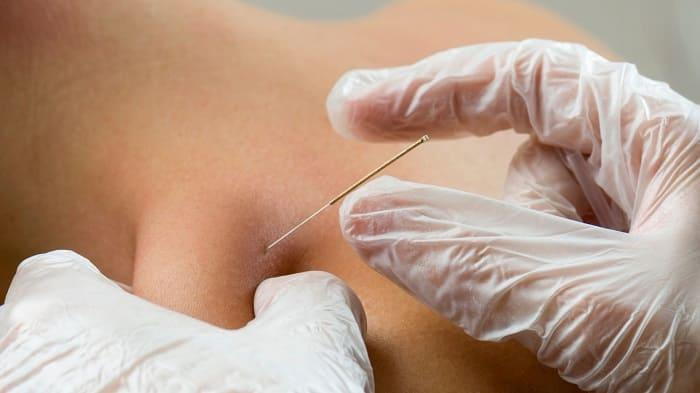What Is Dry Needling Therapy?

Dry needling is an invasive acupuncture technique that has been used for more than 50 years but is just now beginning to gain popularity in the United States. In this blog post, we will try to understand what dry needling therapy is and much more.
History of Dry Needling
Modern trigger points dry needling found its origins in the work of Karel Lewit of Czechoslovakia. In his classic work, he examined the short and long‐term effects of dry needling in the treatment of myofascial pain in 241 patients with 312 painful MTrP sites.
Currently, dry needling is being used by acupuncturists, physical therapists and other healthcare practitioners who treat a variety of ailments, including headache pain, spasticity following a stroke or multiple sclerosis, low back and neck pain, fibromyalgia, carpal tunnel syndrome and many more.
What is Dry Needling Therapy?
Dry needling is a technique used by healthcare providers to treat myofascial pain and dysfunction in skeletal muscle, also known as trigger points. It involves inserting very thin acupuncture needles into painful muscles or hyperirritable spots within muscles (trigger points) that are causing pain in other areas.
How Does It Work?
Dry needling is believed to promote physical and biochemical changes in the affected area by activating endogenous opioids, local endorphins, which block pain signals from being sent to the brain. Dry needling is also believed to stimulate muscle fibers and increase blood flow to the muscle by causing a release of metabolic waste from muscle tissue.
Dry needling is not the same as Acupuncture, although both practices use acupuncture needles which are solid filiform needles. Acupuncture providers have extensive experience with using these techniques, as opposed to physical therapists, medical doctors, and chiropractors who take weekend seminars.
What Conditions Are Treated with Dry Needling Therapy?
Dry needling has been found to be an effective modality for treating many common pain conditions, including chronic neck pain, back pain, and shoulder pain. In addition, there is evidence that dry needling can reduce low-back and hip pain as well as increase both active and passive range of motion in the spine. Dry needling has also been found to be effective in reducing shoulder blade movement (scapular kinematics) and increasing grip strength.
Who Should Use Dry Needling Therapy?
Dry needling is an appropriate treatment for anyone suffering from musculoskeletal pain in the neck, shoulder, lower/upper back, hip or leg. In addition, individuals with acute, subacute, or chronic complaints may benefit from dry needling therapy.
Who Should Not Use Dry Needling Therapy?
Dry needling should not be used for individuals who have active infections or tumors at the site of insertion, people with pacemakers, pregnant women or people with coagulation problems (e.g., hemophiliacs).
Who should you consult for dry needling?
Dry needling is a treatment that has been approved for use by the National Commission for Acupuncture and Oriental Medicine, American Medical Association, the World Health Organization, among others. Therefore, always look for a qualified practitioner of dry needling in Davie.
Be wary of weekend-trained practitioners who present themselves as experts in dry needling. It takes years to become proficient in this technique, and you should choose your doctor or therapist wisely.
Many people now find that Dry Needling therapy is a good solution to help with their muscle pain. Try it out for yourself and see if this form of treatment can alleviate your chronic aches! It’s important to work closely with your doctor so they can recommend the best course of action for you. You deserve relief after all those years of suffering in silence!

